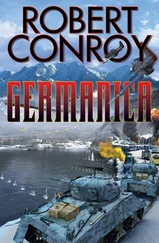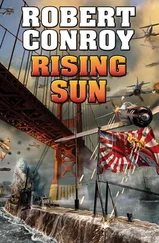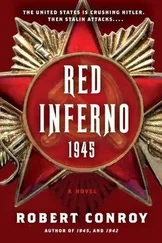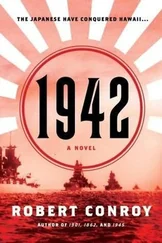Robert Conroy - North Reich
Здесь есть возможность читать онлайн «Robert Conroy - North Reich» весь текст электронной книги совершенно бесплатно (целиком полную версию без сокращений). В некоторых случаях можно слушать аудио, скачать через торрент в формате fb2 и присутствует краткое содержание. Год выпуска: 2012, Жанр: Альтернативная история, на английском языке. Описание произведения, (предисловие) а так же отзывы посетителей доступны на портале библиотеки ЛибКат.
- Название:North Reich
- Автор:
- Жанр:
- Год:2012
- ISBN:нет данных
- Рейтинг книги:4 / 5. Голосов: 1
-
Избранное:Добавить в избранное
- Отзывы:
-
Ваша оценка:
- 80
- 1
- 2
- 3
- 4
- 5
North Reich: краткое содержание, описание и аннотация
Предлагаем к чтению аннотацию, описание, краткое содержание или предисловие (зависит от того, что написал сам автор книги «North Reich»). Если вы не нашли необходимую информацию о книге — напишите в комментариях, мы постараемся отыскать её.
North Reich — читать онлайн бесплатно полную книгу (весь текст) целиком
Ниже представлен текст книги, разбитый по страницам. Система сохранения места последней прочитанной страницы, позволяет с удобством читать онлайн бесплатно книгу «North Reich», без необходимости каждый раз заново искать на чём Вы остановились. Поставьте закладку, и сможете в любой момент перейти на страницу, на которой закончили чтение.
Интервал:
Закладка:
On a map, Great Britain and the Commonwealth looked unchanged. However, a very timid government was now in charge in London with an extremely reluctant Lord Halifax running the show and trying to maintain Great Britain’s existence. Flags stuck in the map indicated the continued presence of very small German garrisons at Belfast, Portsmouth and Liverpool. Their job was to ensure that the British did not rearm and that the negotiations for a permanent peace continued. It appeared that the Germans were treading carefully in England, while England tried to hold the Nazi monster at bay. Still, the status quo could not last forever. Either Great Britain would sign a humiliating treaty or the war would renew. Popular opinion in the Pentagon said that this would happen if Russia collapsed; thus permitting Hitler to focus solely on the British Isles.
Of all the Commonwealth nations, only Canada had been seriously affected by what amounted to a major British defeat. The Nazis had insisted on the right to install an occupying force in Ontario, along with the coastal provinces of Labrador, Newfoundland, Nova Scotia, and New Brunswick. German ships landed at the port of Halifax and supplies and men went by train through Quebec and on to points west. There were no German troops stationed in Quebec. The Quebecois' hatred of Germany was almost boundless and the provincial government was hard pressed to keep locals from blowing up trains and committing other acts of sabotage that were sure to bring savage reprisals down on their part of Canada. For their part, the Nazis kept their troops far away from Quebec.
The U.S. had protested this breach of the Monroe Doctrine, but to little effect. The war with Japan was on center stage. German transgressions would be ignored for the time being. Perhaps forever, Tom thought sadly.
To partly offset this and just prior to England’s collapse, American army and air force personnel had established a base at Gander, Newfoundland, taking over from the British.
Other Commonwealth countries had been spared any direct contact with the Nazis, although there were rumors that some disaffected white South Africans might look positively to working more closely with the Reich, and that the Germans wanted a base in Jamaica. The world looked bleak and strange and there was a madman astride it.
The only positive notes were that the enlarged and strengthened American bases at Iceland and Greenland were still in existence, and the German outrage at America's sudden takeover of Britain’s strategic citadel of Gibraltar had not resulted in military action. Both Spain and Germany had been as stunned by the last minute sale of Gibraltar to the United States by Great Britain as the U.S. had been with Germany's partial occupation of Canada. Spain's pro-German dictator, Francisco Franco, had professed his outrage, but decided not to take on the American army and navy at this time. Hitler too had been angered but decided not to upset the fragile truce between the Third Reich and the United States.
Portugal, also fearing an ambitious fascist Spain, had signed a treaty permitting American warships to be based at Lisbon, which was within striking distance of Gibraltar if the Spaniards attacked, and north at the city of Oporto.
Downing returned and closed the door. "Like what you see?"
"Not really."
"While you were traipsing around Canada, did you get a feel for how the people were taking it?"
"They were sick, stunned, and saddened. Perhaps only a few have decided to become Nazis, but the Germans have given those who have a lot of power and they are nasty. Based on anecdotes and impressions, I'd say that twenty per cent of the Canadian population is more or less in bed with the Nazis, while the rest are still in a state of shock."
"Are the Canadians ready to rebel?"
"Maybe if they had weapons, but they don't. Except for hunting rifles and shotguns, most Canadians don’t have access to real weapons. Hell, the krauts haven't even returned the Canadian Army. The Nazis are holding close to thirty thousand Canadian soldiers hostage, either interned in England or as actual prisoners of war in Germany."
"And how does that compare with the number of German soldiers in Canada?"
"I saw elements of six divisions with more arriving all the time, but they are largely keeping out of sight. There appears to be a massive group of bases north of Toronto. All roads are blocked off and either goons from the Canadian Legion or actual German soldiers are restricting access. I didn't even try to get past their roadblocks."
Downing pulled a bottle of Jim Beam from a bottom desk drawer along with two glasses. He poured generous portions into each and handed one to Tom.
"Glad to have you back, Tom."
"Glad to be back, colonel, but you know I prefer scotch."
"Go to hell, Tom."
What had once been a lush green field was covered by what might appear to be a fleet of wooden barracks and Quonset huts when viewed from the air. Several thousand people, many of them British refugees, now worked and lived in the giant compound. The site had once been a large and prosperous farm that had gone to ruin during the Depression and picked up by the U.S. government for a song. The hard part had been replacing the large number of people who either didn't come to the U.S. from England, or who wished to emigrate to another part of the Commonwealth. Care had been taken by both the U.S. and British governments to ensure that the really key people who'd worked at Bletchley Park had either come to Virginia or had quietly disappeared for the duration. Fortunately, most of the top and best people had come to the U.S. Some realized that if they hadn't they'd have been shot, either by the Germans or their own government.
The massive encampment was surrounded by barbed wire and there were watchtowers every hundred yards or so. A casual observer would have thought it was a prison camp. Someone more observant would have noticed that the machine guns on the towers faced outward. They were to protect the inhabitants, not imprison them.
Even though she'd worked at Camp Washington for several months, twenty-six year old Alicia Cutter had only a vague idea what was going on. Now a first lieutenant in the Women's Army Corps, it seemed only yesterday that she'd been teaching music and art at a private high school for the daughters of wealthy families outside of Philadelphia. A recruiter for the government said that people with musical skills and knowledge were needed. Only later did she realize that some musicians had an affinity to do well at code-breaking.
Alicia, unfortunately, did not. Thus, she was assigned duties as a courier where she supervised a small group of messengers, drivers and guards.
As always, she checked herself in the mirror. Her hair was combed flat, her uniform was baggy, hiding her slender figure, and she wore very little makeup. Good. She had learned to her sorrow that being very attractive, which she was, carried its own curse. Any success she achieved, either in school or as a musician, was attributed to her being pretty, rather than to her brain or her skills with the violin. That she'd slept her way to relative success was one of the kinder things she heard. She'd also been groped and pawed by classmates in high school and college along with professors who assumed she'd be willing to trade the proverbial lay for an A.
Having had enough of that nonsense, she'd made a point of dressing down and worked hard to look plain. She’d even gone so far as to try to gain weight and took to wearing horn rim glasses without any prescription. Her strategy had worked only tolerably well. Some of the military types, both at the camp and in the Pentagon, were unbelievably horny and, in the words of her roommate, would have screwed a female goat if they could find one. She considered the assessment both accurate and funny. Finally, she gave up, threw away the glasses, and went back to her normal weight. She’d felt bloated and the glasses gave her headaches.
Читать дальшеИнтервал:
Закладка:
Похожие книги на «North Reich»
Представляем Вашему вниманию похожие книги на «North Reich» списком для выбора. Мы отобрали схожую по названию и смыслу литературу в надежде предоставить читателям больше вариантов отыскать новые, интересные, ещё непрочитанные произведения.
Обсуждение, отзывы о книге «North Reich» и просто собственные мнения читателей. Оставьте ваши комментарии, напишите, что Вы думаете о произведении, его смысле или главных героях. Укажите что конкретно понравилось, а что нет, и почему Вы так считаете.












